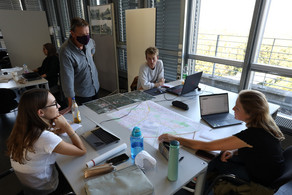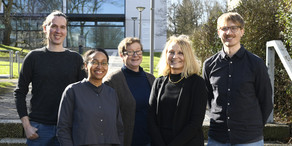Spatial Planning and Sustainable Development in Germany incl. Excursions
The objective of the lecture is the introduction into the core elements of the German Planning System. The students will get to know the system of spatial planning in the Federal State of Germany and the structure of the spatial observation as well as visions for spatial development for Germany and in Europe. The structure of the German planning legislation on local and regional level and requirements for the implementation of planning concepts and its instruments will be part of the lecture. The principles and objectives of urban and regional planning in Germany will be discussed. Aspects of statutory and non-statutory procedures within comprehensive planning processes are added by examples of implementation and compared to other European planning approaches.
Processes of spatial planning, town planning, urban regeneration and urban design on the different levels will be discussed. Main developments and tasks in urban planning in Germany today are strategies for urban renewal, revitalisation of historic towns, reconstruction in particular of assets and stock of from 1960s-1980s, smart cities development strategies, as well as the management of processes of fast growth in some major urban agglomerations such as Munich while at the same time processes of shrinkage for example in Eastern German cities. Discussions will address the history of urban development in Germany and Europe, the main periods of change in German development and reactions within the merit of the German planning system, visions for a sustainable future of cities and towns, as well as contemporary developments such as the digitalisation and inclusion of Information Modelling in urban design and planning processes. Within sectoral planning Germany faces challenges of planning in a multi-level governance system to address tasks such as sustainable infrastructure planning or energy security while delivering renewable energy targets. The course draws on examples from a range of urban development strategies as well as it reflects on processes of multi-level governance coordination in sectoral policies.
The dates of the excursions will be published soon.
The following applies to students of the “Studiums Oecologicum”: The seminar places are subject to the allocation of places by the department. If there are still places available after the internal allocation, the seminar can be attended as part of the Studium Oecologicum. 4 CP are awarded if the course work is completed and active oral participation is witnessed.
Module exam (graded)
Module examination:
Written exam related to 093011 and 093012.
Learning content
The joint lecture between the chairs SBP and SRP refers to the following core elements of the German Planning System:
- Principles and objectives of urban and regional planning in Germany.
- Visions regarding spatial development in Germany and Europe.
- Planning legislation on local and regional level.
- Implementation of planning concepts and related instruments.
- Statutory and non-statutory procedures.
LSF
Click here for the course on LSF









